The Mediterranean Diet is based on the traditional eating habits of countries around the Mediterranean Sea, including Greece, Italy, Spain, and southern France. This diet focuses on fresh, whole foods that are nutritious and flavorful. It is known for its heart-healthy benefits and its positive impact on overall health.
The diet emphasizes eating a variety of vegetables, fruits, whole grains, and lean proteins, such as fish and legumes. Healthy fats, particularly olive oil, are also a key component. This balanced approach provides essential nutrients while promoting a sustainable and enjoyable way of eating.
For those interested in exploring this healthy lifestyle, there are many Mediterranean diet recipes available. These recipes incorporate the wholesome ingredients that make the diet so beneficial, offering delicious meals that support weight loss, heart health, and overall well-being. Adopting Mediterranean diet recipes can be a simple way to enjoy the health benefits of this diet.
This article will explore the basics of the Mediterranean Diet, its health benefits, and provide you with detailed recipes to get started.
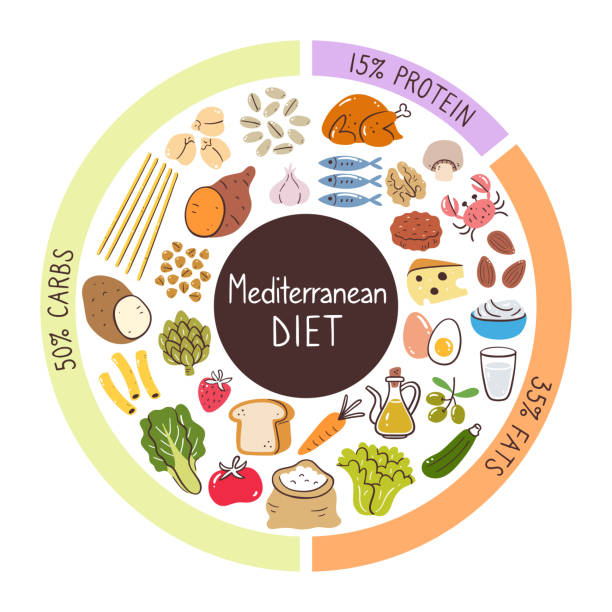
Health Benefits of the Mediterranean Diet
Research has shown that following the Mediterranean Diet can lead to numerous health benefits, including:
Heart Health: The Mediterranean Diet is known for its heart-healthy benefits. It focuses on healthy fats, especially from olive oil and nuts, which help maintain healthy cholesterol levels. Additionally, it includes omega-3 fatty acids from fish, which are known to support heart health by reducing inflammation and lowering the risk of heart disease and stroke. Incorporating Mediterranean diet recipes into your daily meals can be an effective way to promote cardiovascular health.
Weight Management: A key feature of the Mediterranean Diet is its emphasis on whole foods and fiber-rich ingredients, which promote satiety and help with weight management. The high fiber content in fruits, vegetables, and whole grains supports digestion and reduces hunger, making it easier to maintain a healthy weight. The antioxidant-rich foods in the diet, such as berries and leafy greens, also play a role in boosting metabolism. Many Mediterranean diet recipes are designed to be filling yet low in calories, making them an excellent choice for weight control.
Reduced Risk of Chronic Diseases: The Mediterranean Diet is packed with antioxidant-rich foods like fruits, vegetables, and whole grains, which help reduce inflammation and oxidative stress in the body. These factors are linked to the development of chronic diseases such as type 2 diabetes, Alzheimer’s, and even certain types of cancer. By following Mediterranean diet recipes, you can enjoy meals that support long-term health and lower the risk of these conditions.
Improved Brain Function: Studies show that the Mediterranean Diet can benefit brain health by improving cognitive function and reducing the risk of Alzheimer’s disease. The anti-inflammatory properties of foods like olive oil, fish, and leafy greens help protect brain cells and support mental clarity. Mediterranean diet recipes that focus on nutrient-dense ingredients provide the brain with the essential nutrients needed for optimal performance, making them a great choice for cognitive health.
Better Blood Sugar Control: The Mediterranean Diet includes a variety of fiber-rich foods, legumes, and healthy fats that help stabilize blood sugar levels. This is crucial for preventing and managing type 2 diabetes. The diet’s high fiber content slows the absorption of sugars and promotes steady blood sugar levels throughout the day. For those managing diabetes or simply looking to improve their blood sugar control, incorporating Mediterranean diet recipes into your meals can provide significant benefits.
Mediterranean Diet Recipes
Here are some delicious and healthy recipes inspired by the Mediterranean Diet to help you get started:
1. Mediterranean Grilled Chicken Salad
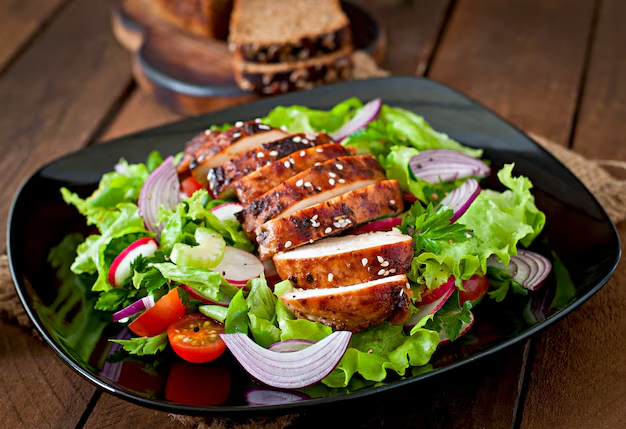
Mediterranean Grilled Chicken Salad is a light and flavorful dish that brings together the best of Mediterranean Diet recipes. It combines tender grilled chicken with a variety of fresh vegetables like tomatoes, cucumbers, red onions, and olives, creating a colorful and nutrient-packed salad.
The salad is dressed with olive oil, lemon juice, and a sprinkle of oregano, giving it that authentic Mediterranean flavor. This simple dressing complements the freshness of the ingredients while providing healthy fats, which are essential in the Mediterranean Diet.
This salad is not only delicious but also heart-healthy, providing a good balance of protein, fiber, and healthy fats. Perfect for lunch or dinner, Mediterranean Grilled Chicken Salad is an easy way to enjoy the benefits of Mediterranean Diet recipes while keeping your meals light and satisfying.
Ingredients:
2 chicken breasts, grilled and sliced
4 cups mixed greens (spinach, arugula, lettuce)
1 cucumber, diced
1 cup cherry tomatoes, halved
1/2 red onion, thinly sliced
1/4 cup Kalamata olives
1/4 cup feta cheese, crumbled
1 tablespoon olive oil
1 tablespoon lemon juice
1 teaspoon dried oregano
Salt and pepper to taste
Instructions:
Preheat the grill to medium heat.
Season the chicken breasts with olive oil, oregano, salt, and pepper. Grill for 6-8 minutes on each side or until fully cooked.
In a large bowl, toss together the mixed greens, cucumber, tomatoes, onion, olives, and feta.
Slice the grilled chicken and add it to the salad.
Drizzle with olive oil and lemon juice, then toss to combine. Serve immediately.
2. Mediterranean Chickpea and Quinoa Bowl
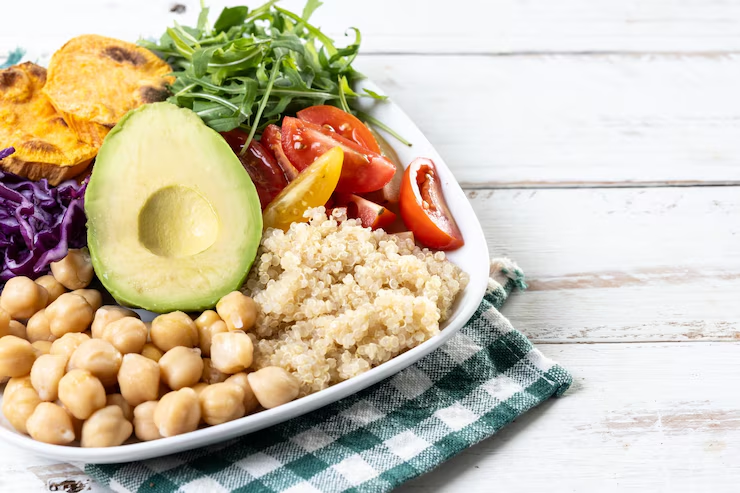
The Mediterranean Chickpea and Quinoa Bowl is a wholesome and filling dish that incorporates key ingredients from Mediterranean Diet recipes. It features chickpeas, quinoa, and a mix of colorful vegetables like cucumbers, tomatoes, and red onions, making it both satisfying and nutrient-dense.
This bowl is topped with a drizzle of olive oil, lemon juice, and a pinch of herbs such as parsley and oregano, creating a flavorful Mediterranean-inspired dressing. The combination of quinoa and chickpeas provides a great source of plant-based protein and fiber, which supports digestion and keeps you feeling full longer.
Perfect as a light meal or a side dish, the Mediterranean Chickpea and Quinoa Bowl is not only delicious but also supports heart health, weight management, and overall well-being. Incorporating this recipe into your diet allows you to enjoy the many benefits of Mediterranean Diet recipes while maintaining a healthy lifestyle.
Ingredients:
1 cup quinoa, cooked
1 can chickpeas, drained and rinsed
1 cucumber, diced
1/2 red bell pepper, diced
1/4 red onion, finely chopped
1/4 cup Kalamata olives, chopped
1/4 cup crumbled feta cheese
1 tablespoon olive oil
1 tablespoon lemon juice
1 teaspoon dried oregano
Salt and pepper to taste
Instructions:
In a large bowl, combine the quinoa, chickpeas, cucumber, red bell pepper, onion, olives, and feta.
In a small bowl, whisk together the olive oil, lemon juice, oregano, salt, and pepper.
Drizzle the dressing over the quinoa mixture and toss gently to combine.
Serve chilled or at room temperature.
3. Baked Salmon with Mediterranean Salsa
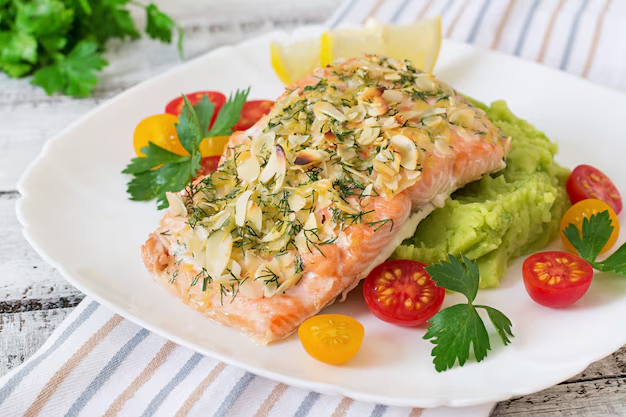
Baked Salmon with Mediterranean Salsa is a flavorful and healthy dish that highlights the benefits of Mediterranean Diet recipes. The salmon is baked to perfection, offering a rich source of omega-3 fatty acids, which are great for heart health.
The Mediterranean salsa is made with fresh ingredients like tomatoes, cucumbers, red onions, and olives, adding a burst of flavor and vibrant color to the dish. Topped with a drizzle of olive oil and a squeeze of lemon, the salsa perfectly complements the richness of the salmon.
This dish is not only delicious but also packed with nutrients that support overall health, including brain function and weight management. By incorporating Baked Salmon with Mediterranean Salsa into your meals, you can enjoy the heart-healthy and anti-inflammatory benefits of Mediterranean Diet recipes while satisfying your taste buds.
Ingredients:
4 salmon fillets
2 tablespoons olive oil
1 teaspoon lemon zest
Salt and pepper to taste
1 cup cherry tomatoes, chopped
1/2 cucumber, diced
1/4 red onion, finely chopped
1/4 cup Kalamata olives, chopped
1 tablespoon fresh parsley, chopped
1 tablespoon lemon juice
Instructions:
Preheat the oven to 375°F (190°C).
Place the salmon fillets on a baking sheet and drizzle with olive oil. Sprinkle with lemon zest, salt, and pepper.
Bake for 15-20 minutes, or until the salmon is cooked through.
In a bowl, combine the tomatoes, cucumber, onion, olives, parsley, and lemon juice to make the salsa.
Serve the salmon topped with the Mediterranean salsa.
4. Vegetable and Lentil Soup
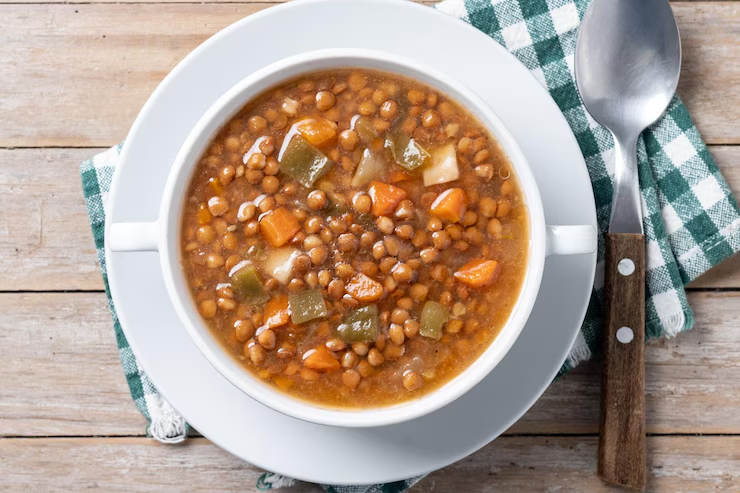
Ingredients:
1 tablespoon olive oil
1 onion, diced
2 carrots, peeled and diced
2 celery stalks, diced
3 garlic cloves, minced
1 cup dried lentils, rinsed
1 can diced tomatoes
6 cups vegetable broth
1 teaspoon ground cumin
1 teaspoon dried thyme
Salt and pepper to taste
1 tablespoon fresh parsley, chopped
Instructions:
In a large pot, heat the olive oil over medium heat. Add the onion, carrots, and celery and sauté for 5-7 minutes, until softened.
Add the garlic and cook for another minute.
Add the lentils, diced tomatoes, vegetable broth, cumin, thyme, salt, and pepper. Bring to a boil, then reduce to a simmer.
Cook for 25-30 minutes, or until the lentils are tender.
Garnish with fresh parsley and serve.
5. Greek Yogurt with Honey and Nuts
Greek Yogurt with Honey and Nuts is a simple and delicious dessert or snack inspired by Mediterranean Diet recipes. It features creamy Greek yogurt, which is rich in protein and probiotics, making it great for digestive health.
Topped with a drizzle of honey, this dish adds natural sweetness while providing antioxidants and antibacterial properties. The addition of nuts, such as almonds or walnuts, gives the dish a crunchy texture and boosts healthy fats, which are essential in the Mediterranean Diet.
This combination of ingredients not only satisfies your sweet cravings but also supports overall health. Greek Yogurt with Honey and Nuts is perfect for those looking for a light, nutrient-packed treat that is heart-healthy and beneficial for weight management. Incorporating this into your diet allows you to enjoy the health benefits of Mediterranean Diet recipes in a delicious and easy-to-make way.
Ingredients:
1 cup Greek yogurt
1 tablespoon honey
2 tablespoons mixed nuts (almonds, walnuts, pistachios), chopped
1/2 teaspoon ground cinnamon (optional)
Instructions:
Scoop the Greek yogurt into a bowl.
Drizzle with honey and top with chopped nuts.
Sprinkle with cinnamon, if desired.
Serve as a healthy snack or breakfast.
Conclusion

In conclusion, embracing the Mediterranean Diet is not only a smart choice for long-term health but also a delicious journey through vibrant, flavorful foods. Rooted in the traditional cuisines of countries along the Mediterranean Sea, this diet emphasizes fresh vegetables, fruits, whole grains, lean proteins, and heart-healthy fats. It promotes balanced eating, mindful meals, and a lifestyle that supports both physical and mental well-being.
Whether you’re looking to improve heart health, manage weight, or simply eat more nutritiously, Mediterranean Diet recipes offer a sustainable and enjoyable path. From hearty lentil soups to grilled fish and fresh salads, the variety and taste of these meals make healthy eating easy and satisfying.
Including Mediterranean Diet recipes into your daily routine can transform your approach to food, turning each meal into an opportunity for nourishment and enjoyment. Start today and experience the lasting benefits of this celebrated and time-tested way of eating.
FAQs
1. What is the Mediterranean Diet ?
The Mediterranean Diet is a way of eating based on the traditional dietary patterns of countries bordering the Mediterranean Sea, such as Greece, Italy, and Spain. It emphasizes whole, minimally processed foods, including vegetables, fruits, whole grains, legumes, nuts, seeds, olive oil, fish, and moderate amounts of dairy and poultry. Red meat and sweets are consumed occasionally.
2. Is the Mediterranean Diet good for weight loss ?
Yes, the Mediterranean Diet can support healthy weight loss. Its focus on whole foods, fiber, and healthy fats helps keep you full longer and reduces overeating. Since it avoids processed and sugary foods, it’s easier to maintain a calorie deficit without feeling deprived.
3. Can I follow Mediterranean Diet recipes if I’m vegetarian or vegan ?
Absolutely. Many Mediterranean Diet recipes are plant-based or easily adaptable. Legumes, grains, vegetables, fruits, nuts, and seeds are staples of the diet. You can substitute animal proteins with beans, lentils, tofu, or tempeh and still stay within the diet’s principles.
4. How often should I eat fish on the Mediterranean Diet ?
It’s recommended to eat fish or seafood at least two to three times per week. Fatty fish like salmon, mackerel, and sardines are excellent choices due to their high omega-3 fatty acid content, which supports heart and brain health.
5. Are Mediterranean Diet recipes expensive to prepare ?
Not necessarily. Many Mediterranean Diet recipes rely on affordable pantry staples like beans, rice, pasta, seasonal vegetables, and olive oil. Planning meals and buying ingredients in bulk can help you enjoy this healthy lifestyle without overspending.



